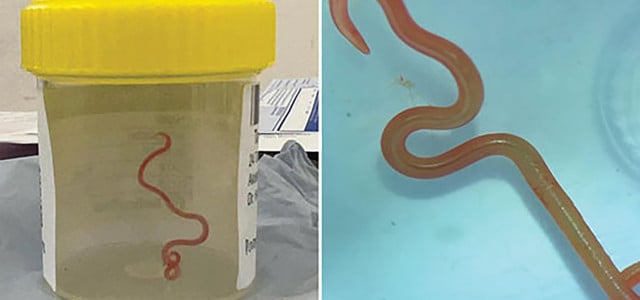
In Australia, a woman complained of abdominal pain, coughing and forgetfulness. During an operation, doctors found a wriggling worm in her brain – a novelty.
Spectacular find during an operation in Australia: In a hospital in Canberra, doctors removed a live roundworm, eight centimeters long, from the brain of a 64-year-old woman. The parasite is the species Ophidascaris robertsi, which is normally found only in pythons, according to a new study in the journal Emerging Infectious Diseases. The operating neurosurgeon was completely perplexed and consulted colleagues, the Australian Guardian reported on Tuesday.
“This is the first human case of Ophidascaris described anywhere in the world,” Australian media quoted Professor Sanjaya Senanayake, a senior infectious disease expert at Canberra Hospital and co-author of the study. “To our knowledge, this is also the first case in which the brain of a mammalian species, whether human or not, is affected.” The doctors described the worm as “alive and wriggling”.
Weeks of abdominal pain and night sweats
In early 2021, the patient from the state of New South Wales initially complained of weeks of abdominal pain and diarrhea, followed by a dry cough and night sweats. A year later, her symptoms also included forgetfulness and depression. The woman was then referred to Canberra Hospital. An MRI scan of her brain eventually revealed abnormalities that necessitated surgery.
“But the neurosurgeon certainly never thought he’d find a wriggling worm,” Senanayake told the Guardian. “Neurosurgeons regularly deal with infections in the brain, but this was a one-time find – nobody expected it.”
How the woman could have been infected
But how did the parasite get into the Australian’s brain? The woman lives in a lake area where carpet pythons also live, it said. Although she hasn’t had direct contact with snakes, she often collects native wild plants and grasses around the lakes to use in cooking. The researchers assume that a python may have excreted parasite eggs in its faeces on the grass. The patient likely became infected after touching the grass and transferring the worm eggs to food or kitchen utensils.
However, the scientists emphasized that an Ophidascaris infection is not transmitted between people. “Therefore, the case of this patient will not trigger a pandemic like Covid-19 or Ebola.”
Read more on Techzle\.com:
- Rising corona numbers: hospital society advises flu vaccination
- Corona numbers are increasing: is it starting again?
- Variant EG.5: Corona cases in Germany are picking up again